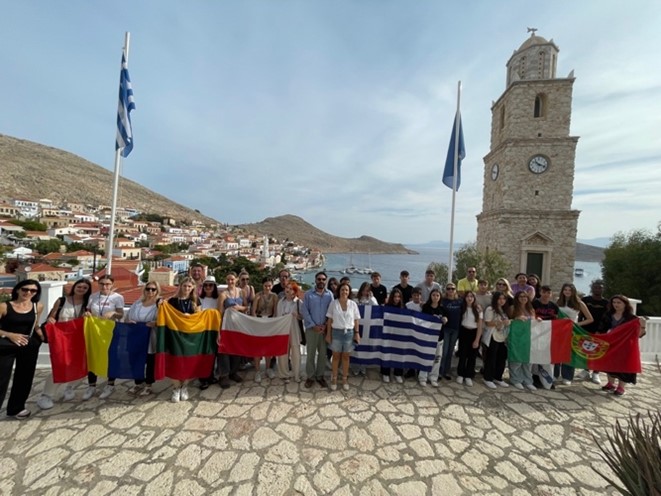
PROJECT JOURNAL – CHALKI, GREECE
C5 – „A zero pollution ambition for a toxic-free environment. Plastic and
water pollution. Ways of eliminating pollution”
23.10.2023 – 27.10.2023
The Economic College „D. Cantemir” Suceava coordinates the Erasmus+ KA220 “Let’s Go Green!” project, between January 2022 and December 2023, in partnership with European schools: Gymnasio L.T. Chalkis, Chalki, Greece, Istituto d’Istruzione Superiore Francesco Ferrara Mazara del Vallo Italy, Ogolnoksztalcace im. Unii Lubelskiej w Lublinie Lublin, Poland, Neringos gimnazija Lithuania Neringa, Lithuania, AEVA – Associacao para a Educacao e Valorizacao da Regiao de Aveiro, Aveiro, Portugal.
Between 23.10 – 27.10.2023, teachers and students from partner schools participated in the fifth mobility within the project, in Chalki, Greece, learning, training and teaching activity organized by Gymnasio L.T. Chalkis. The activities had as a central theme „A zero pollution ambition for a toxic-free environment. Plastic and water pollution. Ways of eliminating pollution”. Zero pollution action plan (towards zero pollution for air, water and soil) is part of the European Green Deal strategy.

Students understood that pollution harms our health and our environment and it is the largest environmental cause of multiple mental and physical diseases and of premature deaths, especially among children, people with certain medical conditions and the elderly. In addition to affecting people’s health, pollution is one of the main reasons for the loss of biodiversity. It reduces the ability of ecosystems to provide services such as carbon sequestration and decontamination. Zero pollution vision for 2050 which includes targets for air, water and soil pollution to be reduced to levels no longer considered harmful to health and natural ecosystems, that respect the boundaries with which our planet can cope, thereby creating a toxic-free environment.
The activities during this LTT focused on pollution in the Mediterranean Sea and highlight the urgent need to reduce the use of plastic in our everyday life. The students met the unique biodiversity of the Mediterranean Sea, the threats it faces, while the ultimate goal was to realise the impact of plastic and microplastic on the ecosystem and the need to eliminate its use to achieve a sustainable future for our planet.
The main objective of this LTT was to raise awareness of the importance of good and responsible use of water, to verify the impact of tourism on the environment and to promote actions from different areas to achieve a toxic-free environment. Participating at the proposed activities, students discovered what is a toxic-free environment and how will achieve it, examples of toxic chemicals in the environment, how they can prevent further chemical pollution in the future, what are substances of concern.
Why did we choose this destination to organize the learning activity?
Chalki is first “Green island”. It is the smallest inhabited island of the Dodecanese. It is part of the Rhodes regional unit. It has a permanent population of 330 (increased during the summer months), concentrated in the only village Emporio.
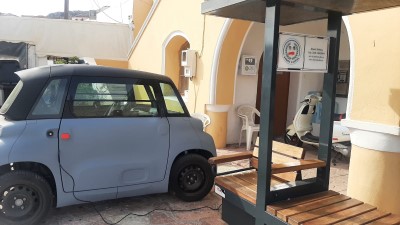
In April 2022, Chalki started a project to electrify its transport by changing to electric cars. Along with the cars, the island also builds a PV plant that is aimed to provide electricity to all its inhabitants. This project is part of the Greek government’s initiative aiming to transform Greek islands into models of green economy, energy autonomy and eco-mobility starting with smaller and non-interconnected islands.
Chalki is the first of several small Aegean islands to be transformed by the Greek government, which signed on 2021 an agreement to turn them into “green islands”. This marked the beginning of the “GR-Eco” project, which aims to make the islands independent of the national grid by providing them with renewable energy sources. As part of this initiative, Chalki has received a solar power plant and a donation of e-vehicles for its public services.
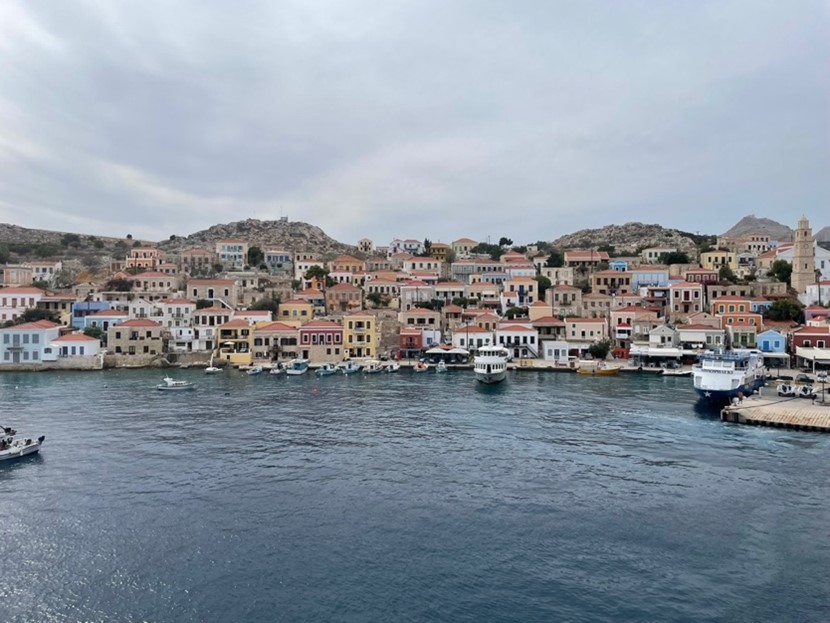
Its telecommunications network has also been upgraded by Vodafone Greece, providing the island with 5G and IoT technologies to transform Chalki into a more connected and sustainable island. This has made a huge difference to people’s lives, upgrading their living standards, enhancing inclusion, and helping boost their economy.
A smart tourist information kiosk, a solar-powered bench, and solar-powered phone charging stations have also been installed in the town centre, and an IoT fleet control service is helping the town monitor its municipal vehicles.
On 23.10.2023 took place the official welcome at Greek school from Chalki. Each partner school presented its team and, to get to know each other, students participated at icebreaking activities organised by Greek students.
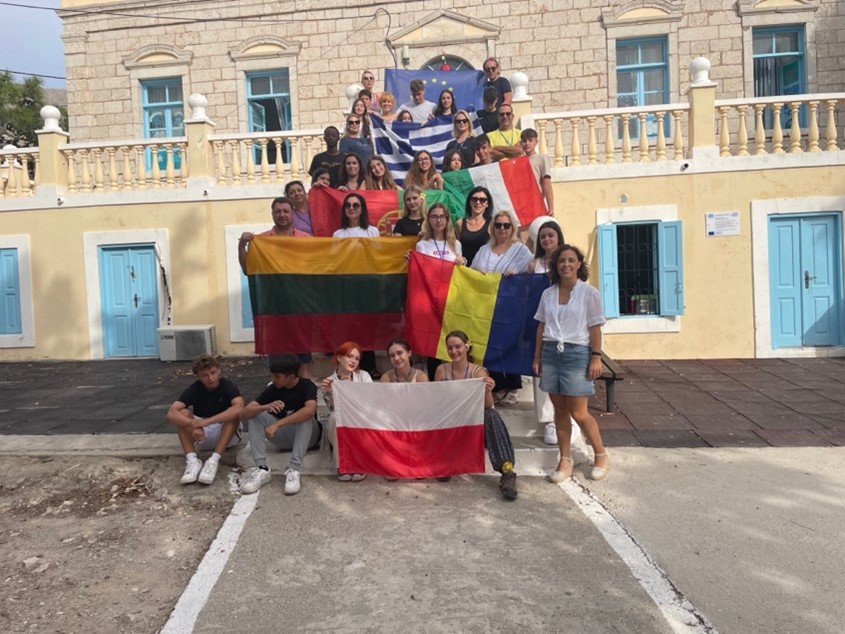
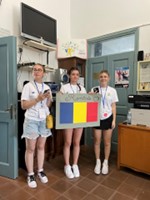
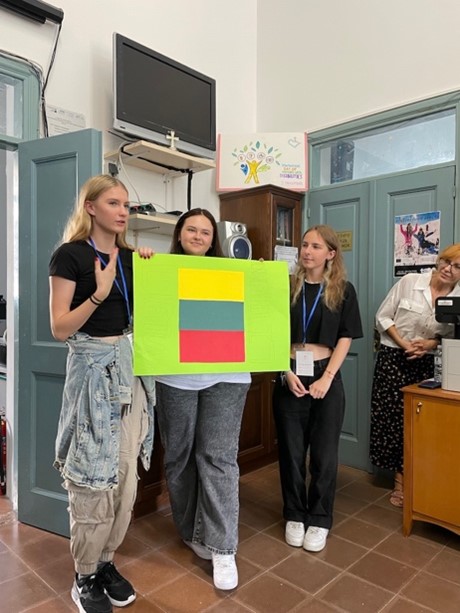
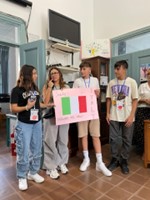
Also, students from each country presented their countries and schools and examples of successful campaigns of fighting air, water and soil pollution nationally.
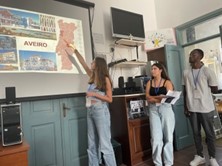
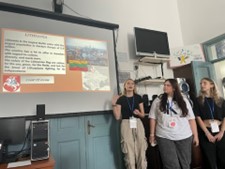
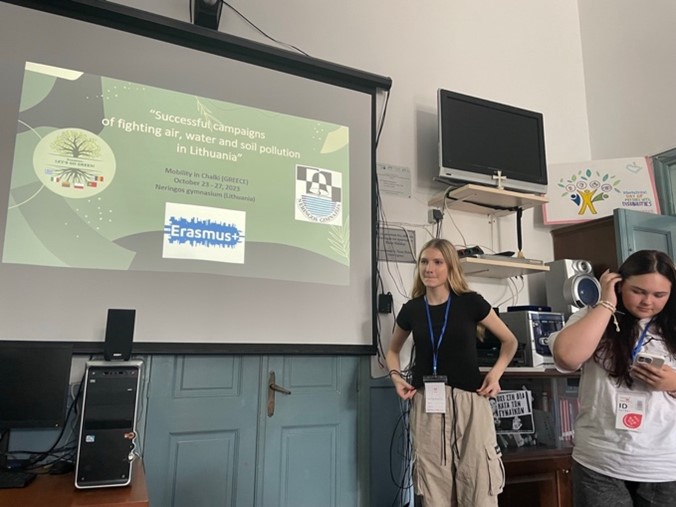
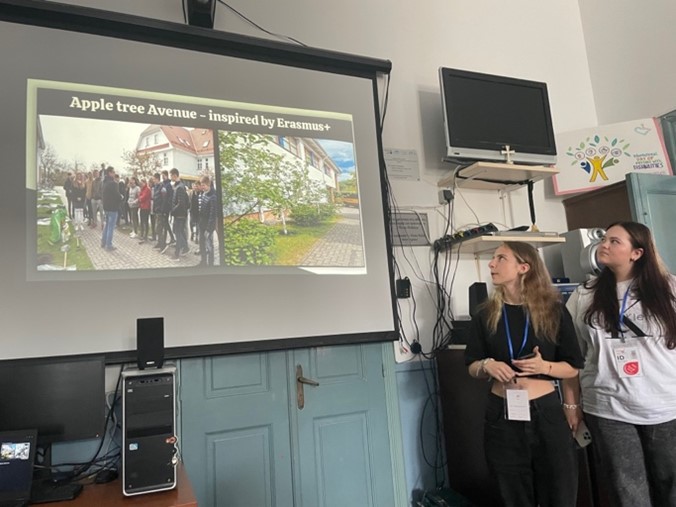
Students attended an educational workshop having the theme „Presentation of the aromatic plants and herbs of the Chalki island” by an agronomist of the regional plant nursery. They discovered that the flora of Chalki consists of 519 vascular plant taxa, 29 of which are under statutory protection and 109 were reported here for the first time. Medicinal and aromatic plants are expected to play an important role in the country’s agricultural profile due to quantitative and qualitative advantages.
Medicinal and aromatic plants cultivation can help small-scale farmers strengthen their livelihoods and as a result, greater access to a wider range of assets can be achieved, and a capacity to build these into successful and sustainable activities. Aromatic plants are often used as natural medicines because of their remedial and inherent pharmacological properties: sage, rosemary, lemongrass, thyme etc.
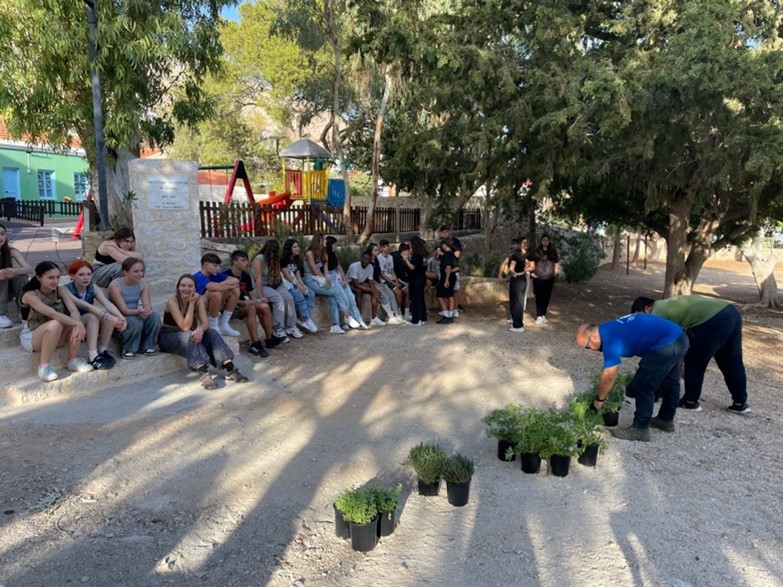
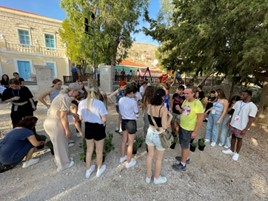
Students planted aromatic herbs in the school’s eco garden.
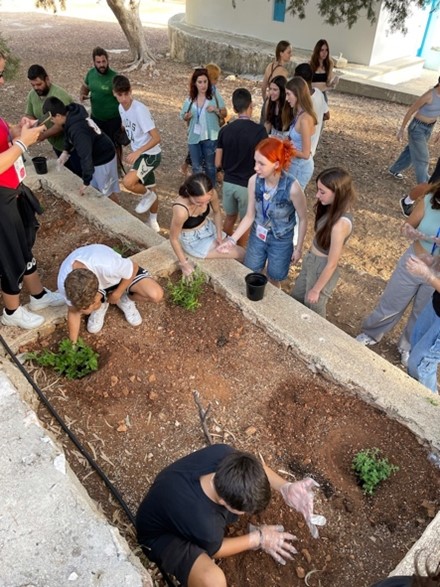
To capture ecological aspects, students participated in a photo contest: “Our feelings for the environment”.
On Tuesday, 24.10.2023, students and teachers participated in a debate having the topic “the unique biodiversity of the Mediterranean Sea”. The Mediterranean basin is a recognised biodiversity hotspot. With 15,000 to 25,000 species, its flora diversity is outstanding and 60% of which are endemic. About one third of the Mediterranean fauna is also unique to the region. Many of them are considered vulnerable, endangered or threatened with extinction, due to their habitat degradation. Pollution, droughts, alien invasive species and overexploitation are also important factors for the decline of Mediterranean biodiversity. Students found out that the coasts are under constant and growing human pressure caused by the activities of 150 million residents and the arrival of 200 million tourists every year, the consequences of which have for decades been uncontrollable.
The conclusion of the debate was: the present situation may be stated in the form of a simple equation: Great biological richness + Strong human pressure = Erosion of biodiversity; already at least 306 animal and plant species are threatened in the Mediterranean.
Students attended an educational workshop „Raising awareness of the importance of good and responsible use of water”. Raising awareness about responsible water usage and conservation is crucial for promoting sustainable practices and protecting this valuable resource. Students learned how to take personal responsability for their water usage habits and act as role models within their communities – share water-saving tips, adopt efficient appliances and fixtures, fix leaks promptly, and practice mindful water usage in daily activities. They learned that by leading by example, individuals can inspire others to follow suit. Also, students understood the value of water and their role in its preservation.
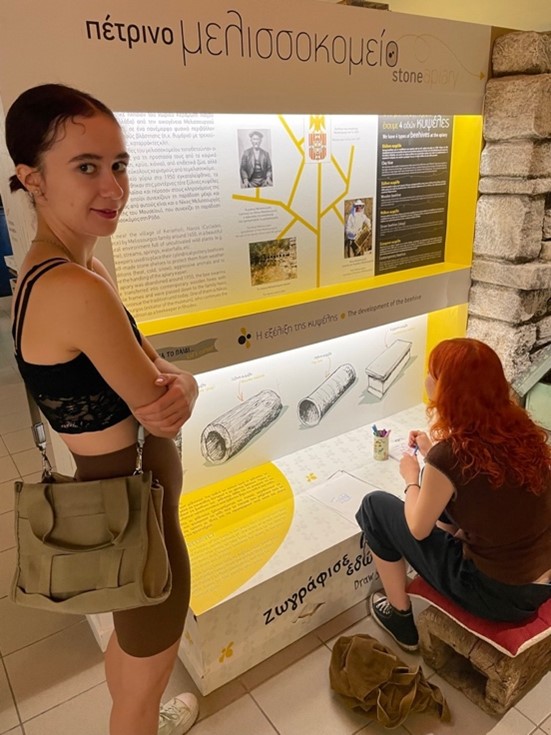
In the afternoon, students attended a webquest “Environmental pollution” https://www.createwebquest.com/node/70635. They promoted this aspect creating leaflets, making presentations and they composed a song about the importance of protecting the environment.
On Wednesday, 25.10.2023, students and teachers participated in a thematic visit to Fish Farm in Kania, search for herbs and recognition of them en route. To capture ecological aspects, students participated in a photo contest: “Our feelings for the environment”.
Students and teachers participated in a educational visit to the Municipality of Chalki – presentation of the environmental policy of the municipality of Activity Description (including profile of participants per organisation, goals and results of the activity).

They attended a presentation about recycling, water desalination, green energy symbolic shore cleaning.
On Thursday, 26.10.2023, students and teachers participated in a thematic visit to the Rhodes Hydrobiological Station for a presentation of the pollution of the seas by the Biologists of the station.
Also, they took part in an educational visit to the “Throne of Helios” (9D experience of Rhodes history in 30 minutes).
On Friday, 27.10.2023, students produced the fifth part of the Green Deal Toolkit: worked on interactive quizzes, using the latest technological resources/platforms, focusing on environmental pollution and ways of eliminating pollution with hints and clues for the wrong answers and reliable sources for more information for each correct answer. Also, they played a Kahoot game https://create.kahoot.it/share/environmental-pollution/a11214d2-e321-4af2-a3e8-f2a44586f1a4.
In the afternoon, students and teachers took part in a cultural visit to Kalithea and Lindos, bee museum by bus (World Heritage Sites UNESCO).
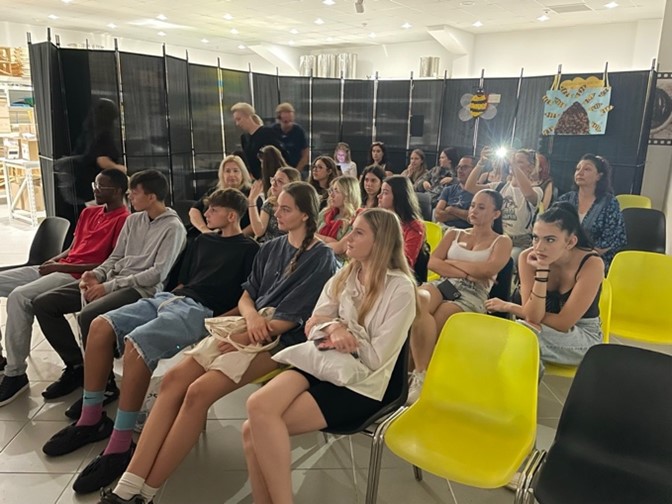
Working on the project results on international level participants improved communication in English language and vocabulary in environment related areas, IT, social and cultural skills. Also, they developed their critical thinking, teamwork spirit, responsibility for nature, sustainable attitudes, ecological and economic actions, in order to ensure comparable or better living conditions for present and future generations.
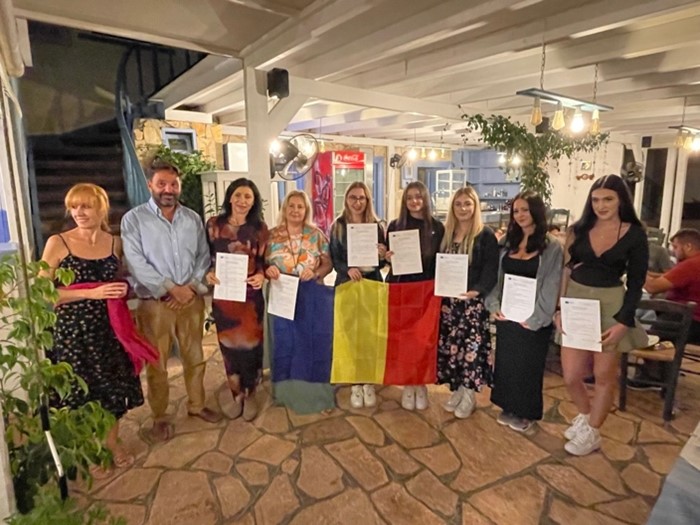
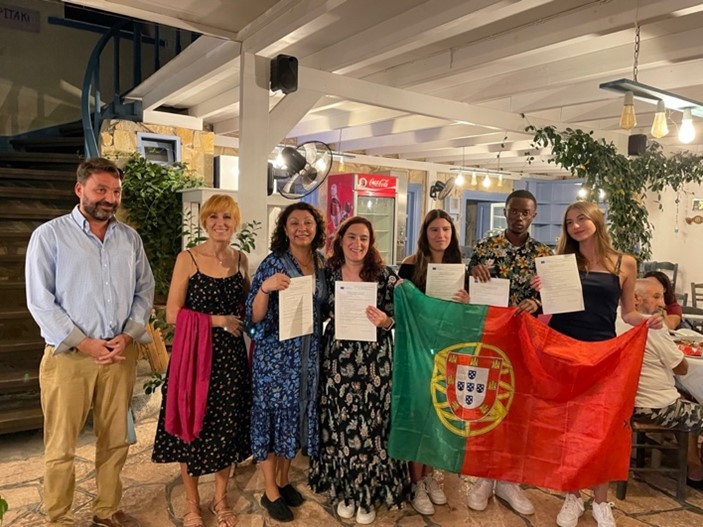
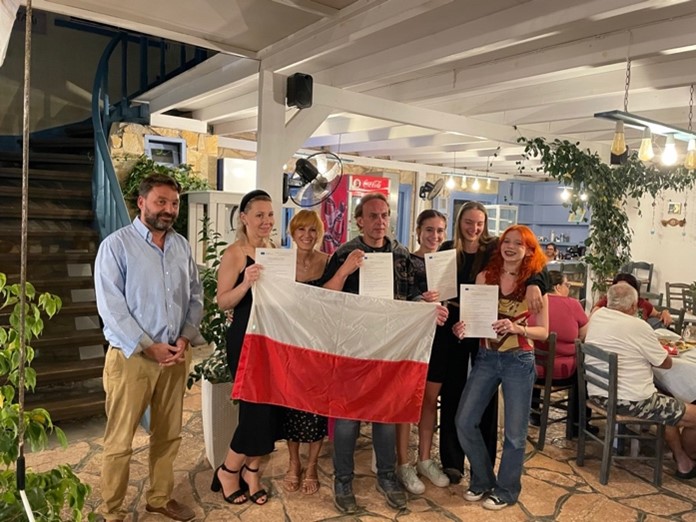
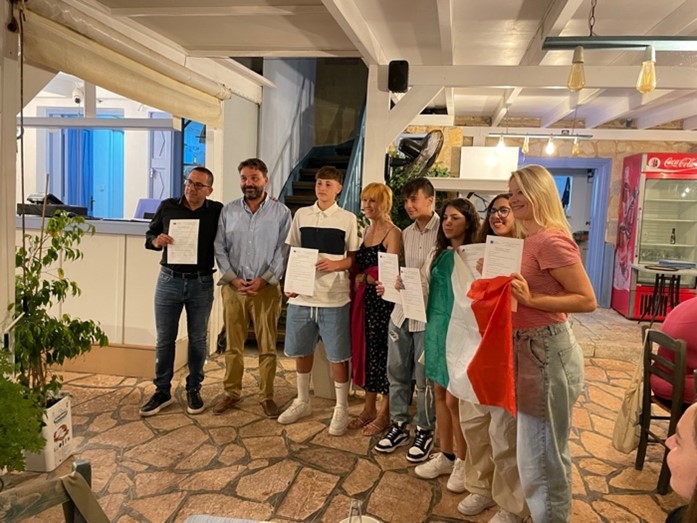
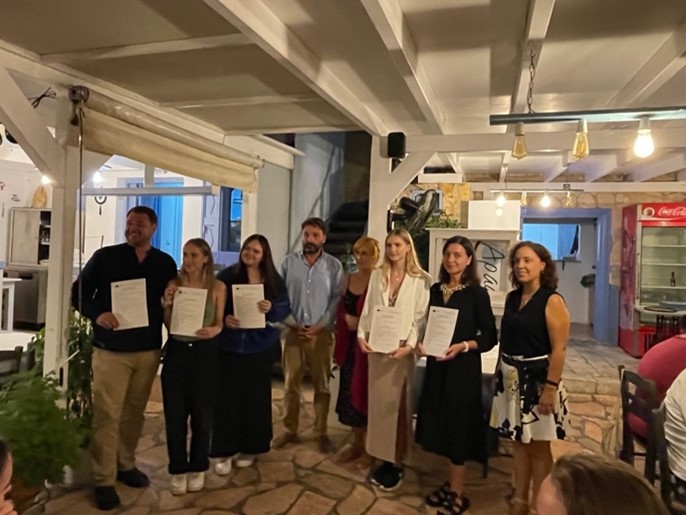
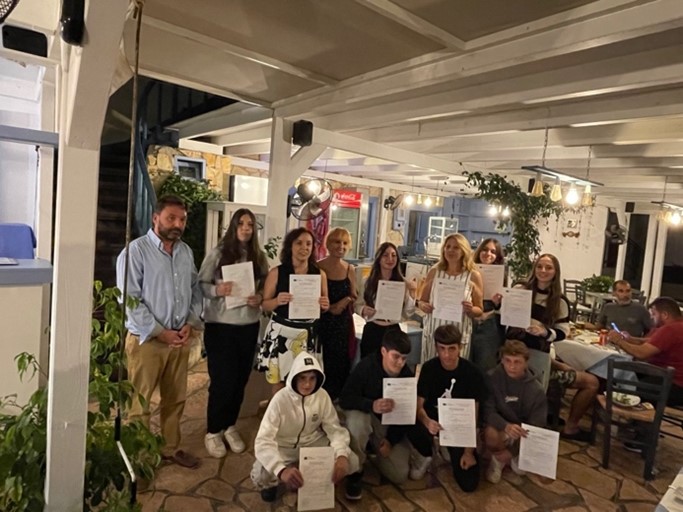
Outdoor education – educational visits (students participated in a variety of adventurous challenges), curiosity and fun during activities (posting InstaStories, photos on social media) increased the quality and quantity of the learning process. By participating in all activities and coming into contact with different cultures, students became receptive to European heritage, became more sensitive to the meaning of European culture, ecologically aware and willing to consciously protect the environment.
The activities carried out in school workshops and open discussions gave students the opportunity to show their artistic and creative potential, to participate in experiences that helped them learn not only scientific information, but also practical ways of action.
Participating in lessons using webquests, using Microsoft and web 2.0 tools and the Google game in an intercultural way stimulated the students’ academic success, improved their English level and specific vocabulary related to the environment.
What we learned about Greek gastronomic culture?
Greek cuisine mainly uses fresh local ingredients such as Mediterranean vegetables, olive oil, Greek yogurt, Greek honey, feta cheese, various types of fish and meat, and muesli. Greek dishes are delicious and packed with a variety of fresh and dried herbs. Food is a huge part of Greek culture. There are literally hundreds of dishes! This guide to the food of Greece includes 50 of the most popular Greek dishes.
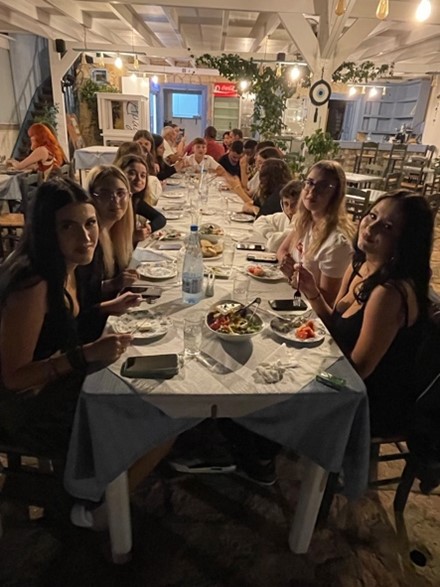
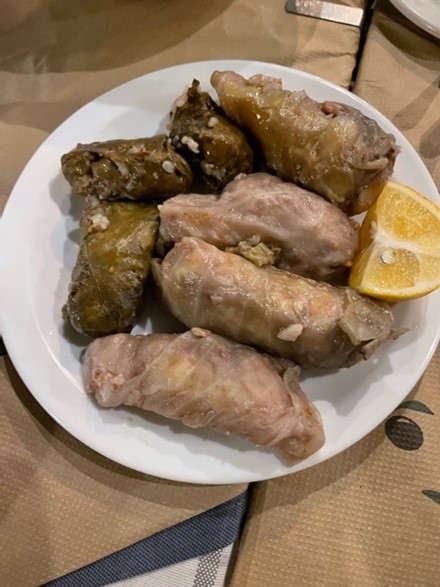
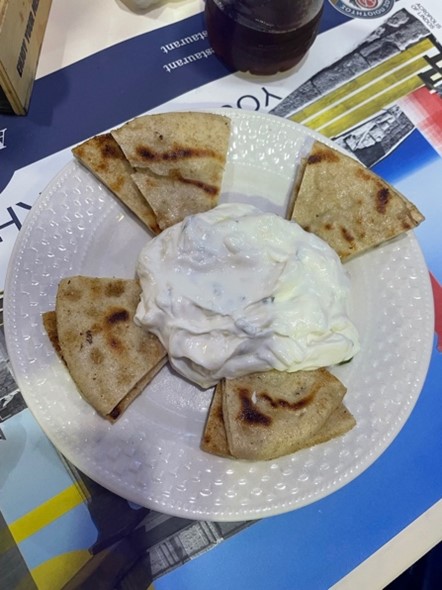
However, Greek food has to do with much more than just flavours and dishes. It’s all about the excellent ingredients, the lengthy procedure involved in preparing the food, and the culture of sharing dishes with others (Mediterranean diet). Greek food begins with extra virgin olive oil and feta cheese
Traditionally, food in Greece is made from fresh ingredients. They use vegetables, various types of horta, pulses, nuts, Greek yogurt, cheese, grains, fish and small amounts of meat. Fresh fruit, honey and spices are popular as well.
The conclusion was: the Mediterranean diet, where Greek cuisine falls under, is one of the healthiest in the world! Due to the quality and variety of ingredients, Greek dishes are full of antioxidants, vitamins, minerals and healthy fats, which help maintain good health.
Responsibility for the information and views set out in this publication lies entirely with the
project team. The European Commission support for the production of this publication doesnot constitute an endorsement of the contents which reflects the views only of the authors, and the Commission cannot be held responsible for any use which may be made of the information contained therein.

